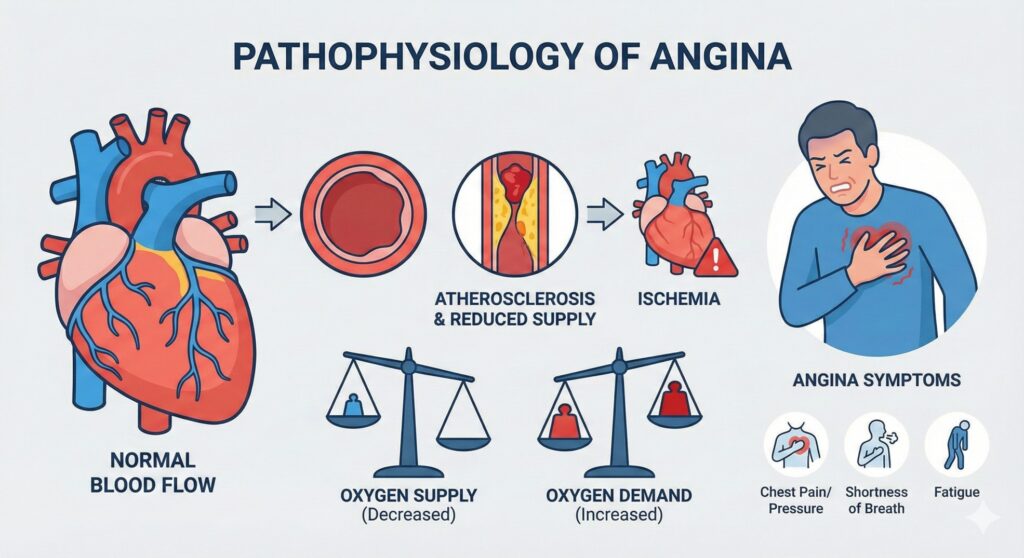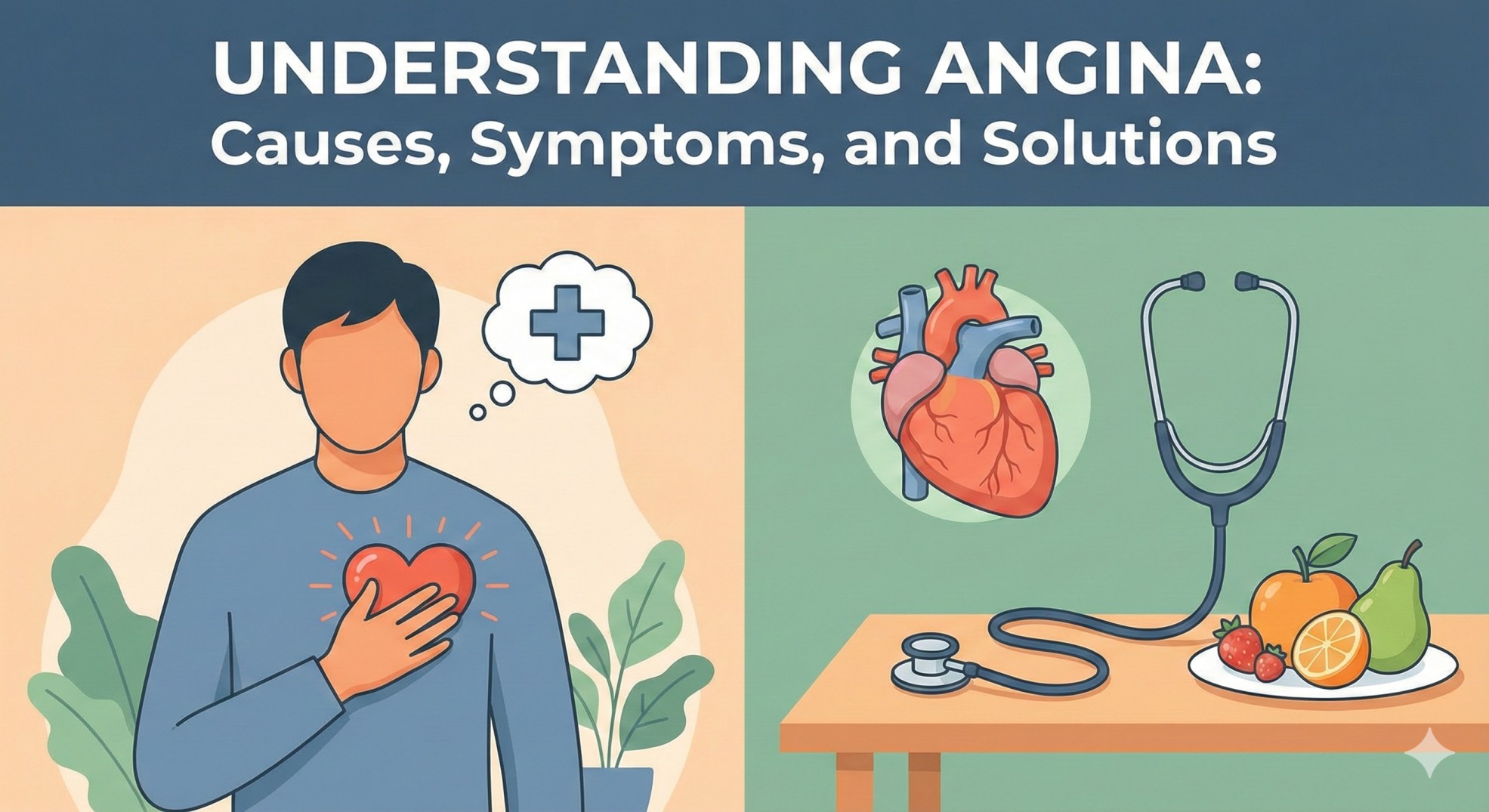Angina pectoris, commonly known as angina, is a type of chest pain caused by reduced blood flow to the heart. This article provides a detailed exploration of angina pectoris, including its classification, types, pathophysiology, and treatment for individual types. We’ll also incorporate flowcharts to help illustrate these concepts.
What is Angina Pectoris?
Angina pectoris is a medical term for chest pain or discomfort caused by an insufficient supply of oxygen-rich blood to the heart muscle. This condition is usually a symptom of underlying heart disease, specifically coronary artery disease (CAD). But what causes this insufficient blood supply? Let’s delve into the pathophysiology of angina pectoris.
Pathophysiology of Angina Pectoris
The heart, like any other organ, requires a constant supply of oxygen to function effectively. This oxygen is delivered to the heart muscles through a network of blood vessels known as the coronary arteries. When these arteries become narrowed or blocked, the heart muscle doesn’t receive enough oxygen, leading to a condition known as ischemia. This ischemia triggers the chest pain known as angina pectoris.

Role of Plaque in Angina Pectoris
The primary cause of this narrowing or blockage is the buildup of plaque, a substance made up of fat, cholesterol, calcium, and other substances found in the blood. Over time, this plaque hardens and narrows the arteries, limiting the flow of oxygen-rich blood to the heart muscle. This process is known as atherosclerosis.
Triggering Factors of Angina Pectoris
Certain factors can trigger angina pectoris by increasing the heart’s demand for oxygen. These include physical exertion, emotional stress, extreme temperatures, heavy meals, and smoking. When the demand for oxygen exceeds the impaired supply, angina pectoris occurs.
Classification of Angina Pectoris

Angina pectoris can be classified into several types, each with its own distinct characteristics and treatment approaches. The main types are stable angina, unstable angina, and variant (Prinzmetal’s) angina.
Stable Angina
Stable angina, also known as angina pectoris, is the most common type of angina. It typically occurs with exertion and goes away with rest or medication. The symptoms are predictable and usually last less than five minutes.
Unstable Angina
Unstable angina is a more serious condition that may precede a heart attack. It occurs unexpectedly, often at rest, and its symptoms are more severe and last longer than those of stable angina.
Variant (Prinzmetal’s) Angina
Variant angina, also known as Prinzmetal’s angina, is a rare type of angina caused by a spasm in a coronary artery. It usually occurs at rest, often in the early morning hours, and can be severe.
Diagnosis of Angina Pectoris
The diagnosis of angina pectoris involves a thorough medical history, physical examination, and several tests. These tests may include an electrocardiogram (ECG), stress testing, echocardiogram, coronary angiography, and blood tests.
Electrocardiogram (ECG)
An ECG is a simple and fast test that records the electrical signals in your heart. It can detect if your heart is enlarged or if it’s beating irregularly, which could be signs of heart disease.
Stress Testing
During a stress test, you’ll exercise (or be given medication if you’re unable to exercise) to make your heart work hard and beat fast while heart tests are performed.
Echocardiogram
An echocardiogram uses sound waves to produce images of your heart, showing its size, structure, and motion.
Coronary Angiography
Coronary angiography uses dye and special X-rays to show the insides of your coronary arteries. It can show whether plaque is blocking your arteries and how severe the blockage is.
Treatment for Individual Types of Angina Pectoris
The treatment for angina pectoris depends on the type and severity of the condition. The main goals of treatment are to relieve symptoms, slow or stop the progression of the disease, and reduce the risk of future heart attacks.
Treatment for Stable Angina
Treatment for stable angina includes lifestyle changes, medication, and sometimes, revascularization procedures like angioplasty and stenting or bypass surgery. Medications can include nitrates, beta-blockers, calcium channel blockers, and antiplatelet drugs.
Treatment for Unstable Angina
Unstable angina is a medical emergency that requires immediate treatment in the hospital. Treatment may include medications to prevent blood clots, reduce heart workload, and stabilize plaque. Procedures to restore and improve blood flow to the heart are often necessary.
Treatment for Variant Angina
Variant angina is usually treated with medications that relax and widen blood vessels, reducing the frequency and severity of angina attacks. These medications include calcium channel blockers and nitrates.
Click here to go to the page about drug treatment.
Living with Angina Pectoris
Living with angina pectoris can be challenging, but with the right treatment and lifestyle changes, most people can lead a normal life. Regular exercise, a healthy diet, quitting smoking, and managing stress are all crucial parts of living well with angina pectoris.
Conclusion
Angina pectoris is a serious condition that requires prompt medical attention. Understanding its types, causes, and treatment options can help you manage the condition effectively and lead a healthy life. Remember, early detection and treatment can significantly improve the outcome.
FAQs about Angina Pectoris
What is the main cause of angina pectoris?
The main cause of angina pectoris is an insufficient supply of oxygen-rich blood to the heart muscle, usually due to the narrowing or blockage of the coronary arteries by plaque.
What are the symptoms of angina pectoris?
Symptoms of angina pectoris include chest pain or discomfort, pain in your arms, neck, jaw, shoulder, or back, nausea, fatigue, shortness of breath, sweating, and dizziness.
How is angina pectoris diagnosed?
Angina pectoris is diagnosed based on your symptoms, medical history, physical examination, and several tests such as an electrocardiogram (ECG), stress testing, echocardiogram, and coronary angiography.
Can angina pectoris be cured?
While angina pectoris can’t be cured, its symptoms can be managed effectively with medication, lifestyle changes, and in some cases, surgical procedures.
Can you live a normal life with angina pectoris?
Yes, with the right treatment and lifestyle changes, most people with angina pectoris can lead a normal life.
Can exercise help angina pectoris?
Yes, regular exercise can help manage angina pectoris by strengthening the heart muscle, improving circulation, and reducing symptoms.
Disclaimer: This article is for informational purposes only and should not be taken as medical advice. Always consult with a healthcare professional before making any decisions related to medication or treatment.
Quiz on angina pectoris
📚 AI Pharma Quiz Generator
🎉 Quiz Results
Medical Disclaimer
The medical information on this post is for general educational purposes only and is provided by Pharmacology Mentor. While we strive to keep content current and accurate, Pharmacology Mentor makes no representations or warranties, express or implied, regarding the completeness, accuracy, reliability, suitability, or availability of the post, the website, or any information, products, services, or related graphics for any purpose. This content is not a substitute for professional medical advice, diagnosis, or treatment; always seek the advice of your physician or other qualified health provider with any questions you may have regarding a medical condition and never disregard or delay seeking professional advice because of something you have read here. Reliance on any information provided is solely at your own risk.

